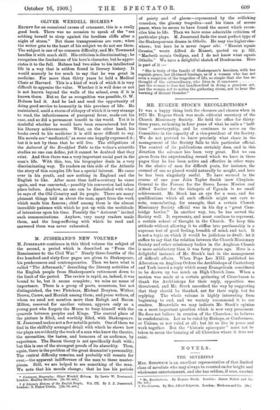M. J1JSSERAND'S NEW VOLUME.f M. JIISSERAND continues in this third
volume the subject of the second, a period which is described as " From the Renaissance to the Civil War." Nearly three-fourths of the five hundred and sixty-four pages are given to Shakespeare, his predecessors and contemporaries. Then we have what is called " The Aftermath," describing the literary activities of the English people from Shakespeare's retirement down to the limit of the period. The review is rapid, as, indeed, it was bound to be, but it seems complete ; we miss no name of importance. There is a group of poets, numerous, but not distinguished, the two Fletchers, Michael Drayton, Wither, Brown, Carew, and Herrick among them; and prose writers, of whom we need not mention more than Ralegh and Bacon. Milton, reserved for another volume, appears only as a young poet who forgets the Muses to busy himself with the quarrels between peoples and Kings. The central place of the picture is filled, and worthily filled, with Shakespeare. M. Jusserand makes not a few notable points. One of them we find in the skilfully arranged detail with which he shows how the plays are evidently the work of a man who knew the theatre, the necessities, the tastes, and humours of an audience, by 'experience. The Bacon theory is not specifically dealt with ; but this is one of the strongest proofs of its absurdity. Then, again, there is the problem of the great dramatist's personality, The central difficulty remains, and probably will remain for ever,—the apparent indifference of the man to these master- pieces. Still, we are helped to see something of the man. We note that his moods change ; that he has his periods
• Centenary Biography : Oliver Wendell Holmes. By Lewis W. Townsend. London: Headley Brothers. [2s. Bd. net.] A. Literary History of the English P*01314. VOL III. By J. .Tnsserand.
London T. Pith= Unwin. [12s. 6d. net.]
of gaiety and of gloom—represented by the rollicking comedies, the gloomy tragedies—and his times of serene peace, when he seems to have found the secret which recon- ciles him to life. Then we have some admirable criticism of particular plays. M. Jusserand finds the most perfect type of
the Shakespearean drama in Othello. He may rise higher else- where; but here he is never impar sibi. "Hamlet equals
Orestes," wrote Alfred de Musset, quoted on p. 322, "Macbeth equals Oedipus, and I do not know what equals Othello." We have a delightful sketch of Desdemona. Here is part of it :-
" She is truly of the family of Shakespeare's heroines, with her roguish grace, her ill-timed teasings, as of a woman who has not even a suspicion of the tragedies of life, so simple that she has no
thought of the extraordinary, who lives in it unawares just the woman to lose her handkerchief in doing a gracious act, just the woman not to notice the gathering storm, not to hear the warning of distant thunder."














































 Previous page
Previous page